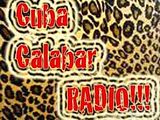In
November, 2011 several Ékpè
leaders from Cameroon gave a certificate of recognition to their Cuban Abakua
counterparts, that stated: “This is to certify that the title of Ntongho Eyang Ékpè has been awarded to the Cuban Ékpè, for their dedication towards the preservation, research
and promotion of the Ékpè culture. On this day
of October 17th, 2009. Signed Sisiku Emmanuel Ojong Orok.”
Ntongho
Eyang Ékpè means ‘teacher of Ékpè’ in the
Ejagham language of Nigeria and Cameroon.
Roman Diaz is photographed here with Dr. Ivor Miller, Sisiku Philip Tazi (our gracious and most generous host), Sisiku Emmanuel Ojong Orock. This Ékpè ceremony commenced a week of activities with Ékpè U.S.A and Dr. Miller's talk "A Cultural History of Cross River Civilization" at the National Museum of African Art, Washington D.C., where he is currently a Smithsonian Senior Fellow. Roman Diaz was a featured artist along with Cameroon Ékpè masquerades, who were all graciously welcomed with introductory remarks by the Museum’s Director, Dr. Johnnetta B. Cole.





